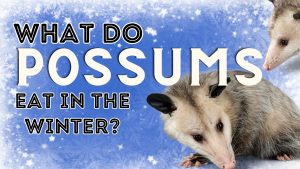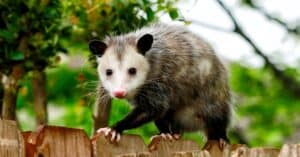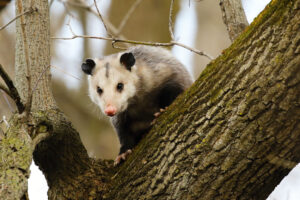If you’ve done any research on possums, you’ve probably encountered the claim that they love eating ticks. In fact, some sources call them “vacuum cleaners for ticks” due to their apparent love for these tricky little parasites. But it turns out, the issue is more complicated than we first assumed. So, do possums eat ticks or not? Read on to discover the answer!
What is a Possum?
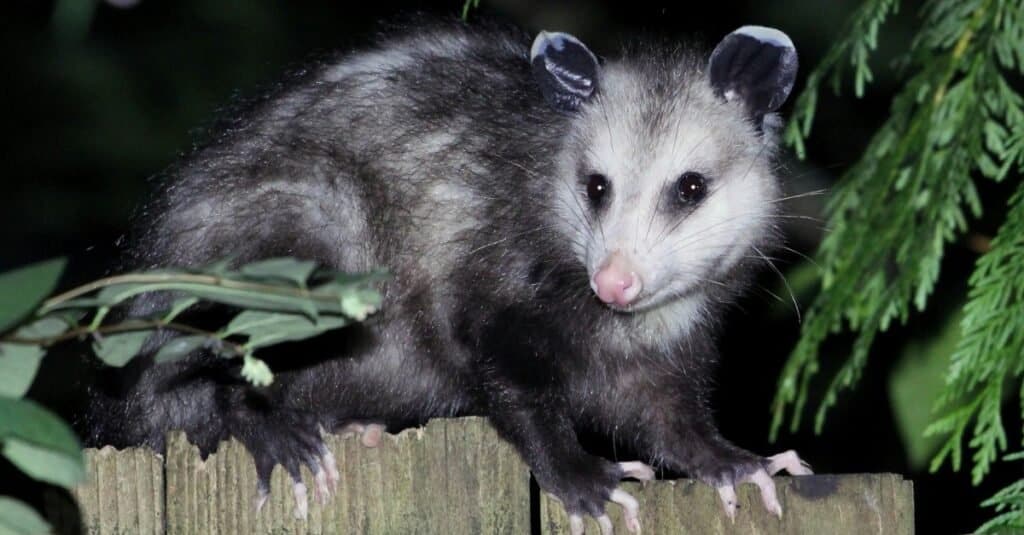
A Virginia Opossum on a fence at night. The Virginia (or common) opossum is the only North American marsupial. A marsupial is a mammal that has a pouch where it carries its young.
©iStock.com/randimal
Possums are marsupials, a type of mammal with a pouch for carrying its young. Possums are found in two main areas of the world: the Americas (including North, Central, and South America) and Australasia (including Australia and the surrounding islands). “Possum” technically refers to marsupials living in Australasia while “opossum” refers to marsupials living in the Americas.
However, many people use “possum” to refer to both types, especially the Virginia opossum, which inhabits North America. As this article deals with the Virginia opossum and its tick-eating behaviour, it will use “possum” and “opossum” interchangeably.
The Virginia opossum is the only marsupial living north of Mexico. It roams as far north as Canada and is a common sight in backyards across North America. Though many people see the species as a destructive pest, wildlife advocates rightly point out its benefits, which include cleaning up carrion and rotting plant matter. But do these benefits include eating ticks by the thousands?
Do Possums Eat Ticks?
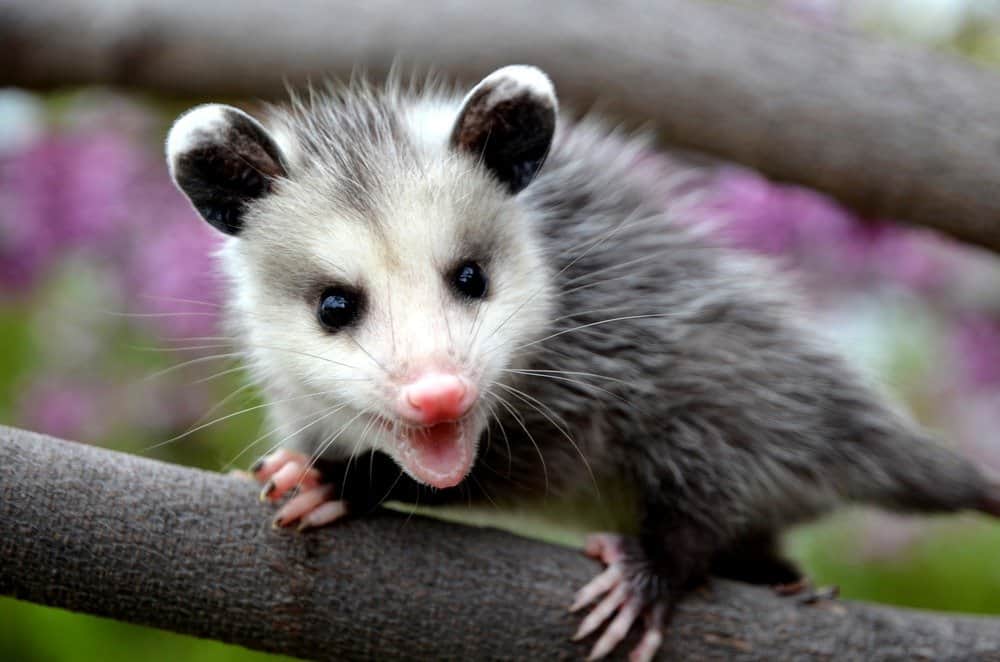
One study estimated that ticks are 5,500 ticks per week. However, new research has since debunked this claim.
©rthoma/Shutterstock.com
Possums do not typically eat ticks in the wild. In recent years, wildlife advocates have trumpeted the tick-eating proclivities of possums in an effort to change the public perception of this species. Websites frequently quote a consumption rate of 5,500 ticks a week per possum. If true, this would be an astonishing number of dead ticks and would more than earn possums our undying respect.
Unfortunately for possums and tick-haters alike, this figure is not correct. In fact, the entire assumption that Virginia opossums are tick fanatics is false. While possums are capable of consuming ticks and tick larvae, they don’t choose to do so in the wild. Instead, they focus on a plethora of other food sources to get the nutrition they need.
The 2021 Study That Debunked the Possum-Tick Theory
Until recently, scientific studies appeared to support the theory that possums were avid tick-lovers. However, in 2021 Drs. Cecilia Hennessy and Kaitlyn Hild published a study with the Division of Math and Sciences at Eureka College that turned these assumptions on their head. They called the study, “Are Virginia Opossums Really Ecological Traps for Ticks? Groundtruthing Laboratory Observations.”
This long-winded title leads readers to a surprising outcome: possums do not appear to eat ticks in the wild. In their search for the truth, Hennessy and Hild “comprehensively analyzed stomach contents of 32 Virginia opossums from central Illinois” but “did not locate any ticks or tick parts in the stomach contents of Virginia opossums.”
In an effort to confirm or refute their findings, they hunted down 23 studies dealing with the same subject matter. 19 of these studies dealt with the stomach and digestive tract contents of Virginia opossums and four of the studies analyzed their scat. None of them corroborated the myth that possums eat ticks, leading Hennessy and Hild to conclude that “ticks are not a preferred diet item for Virginia opossums.”
Why Do People Think Possums Eat Ticks?
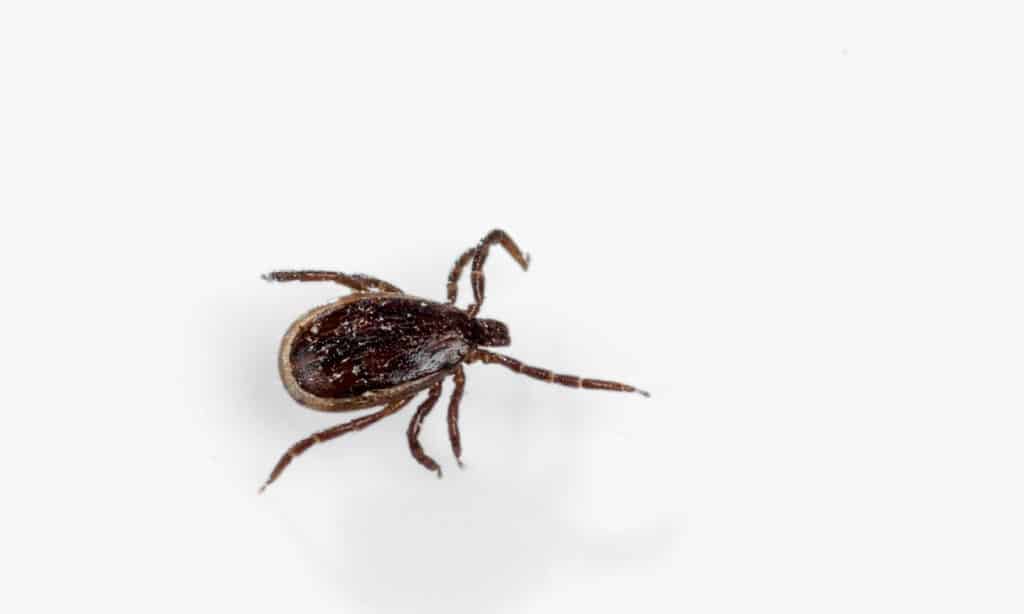
Despite their frigid-sounding name, winter ticks live in all southern states
©iStock.com/VladK213
So where did people get the idea that possums eat ticks if scientific studies don’t appear to support it? It turns out, most of the credit goes to a 2009 study in the Proceedings of the Royal Society B journal titled “Hosts as Ecological Traps for the Vector of Lyme Disease.”
The study compared six species known to attract ticks: white-footed mice, eastern chipmunks, grey squirrels, Virginia opossums, veeries, and catbirds. The researchers infested each animal with 100 larval ticks and monitored them to determine which species allowed ticks to feed and which species ate them. They found that opossums and squirrels appeared to eat the most ticks, between 83-96% of the ticks that researchers placed on their bodies.
How did the researchers come to this conclusion? They counted the number of ticks that dropped off the animals after feeding; ticks “not accounted for directly were assumed to have been consumed or destroyed during grooming.” In other words, the researchers assumed that the animals had eaten any ticks that didn’t drop to the trays beneath them.
Hennessy and Hild noted that the researchers in the 2009 study didn’t check the animals for ticks before releasing them back into the wild, meaning the ticks could still have been attached. Alternatively, they proposed that possums in captivity may behave differently than possums in the wild as they don’t have the same access to their usual diet. In the absence of their preferred meals and habits, they may resort to eating ticks off their bodies. Possums may also occasionally ingest ticks by accident while grooming themselves.
What Do Possums Eat?
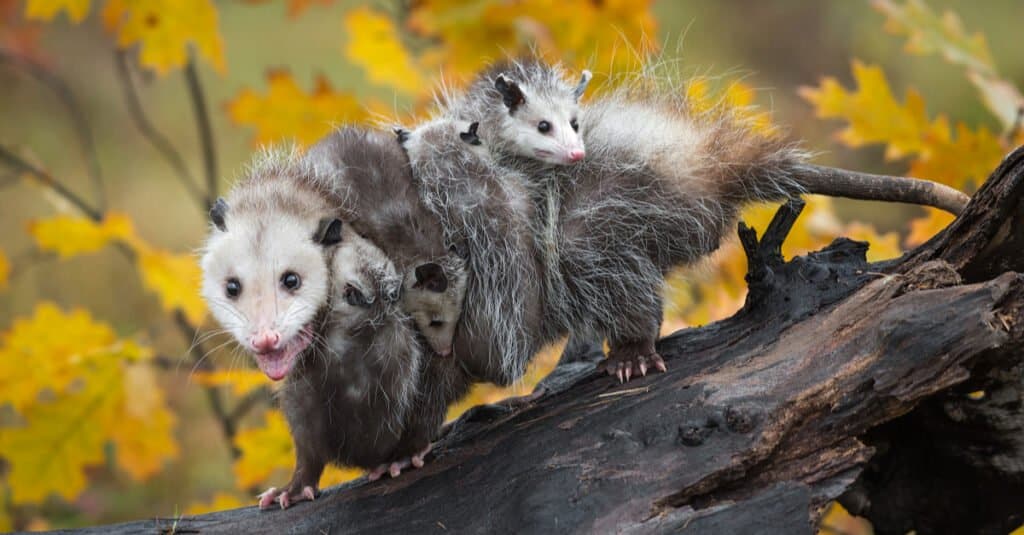
Opossums clean up waste, bacteria, and insects from the environment.
©Holly Kuchera/Shutterstock.com
Possums eat a wide variety of foods. Though they don’t eat ticks, they eat other insects like grasshoppers, crickets, and cockroaches. They also love fruits, seeds, and other plant matter. Occasionally they hunt small animals like rodents, amphibians, reptiles, fish, and birds. They enjoy eating eggs when they can find them. Unlike most other animals, they also consume carrion like roadkill.
Do Possums Carry Ticks?
Possums may not seek out ticks as a meal, but that doesn’t mean they can avoid their presence entirely. Ticks latch onto possums much as they would any other animal, including disease-bearing ticks. Fortunately for possums, they appear to be largely immune to conditions such as Lyme disease.
What Diseases Do Ticks Carry?
Ticks carry a number of diseases that can cause illness for humans and animals alike. These include:
- Anaplasmosis
- Babesiosis
- Bourbon virus
- Colorado tick fever
- Lyme disease
- Rocky Mountain spotted fever
- Tickborne relapsing fever
- Tularemia
How Do Ticks Transmit Disease?
Ticks transmit disease when they bite humans or other animals. When they find a host, they latch on by cutting into the skin and inserting a proboscis (feeding tube). Some ticks inject anesthetic through their salvia to dull the pain of the bite. They hang on with their legs and small barbs on their proboscis, which makes them difficult to remove. They slowly suck blood over the course of several days until they’ve had their fill. Their saliva, which often transfers to their hosts during feeding, carries any diseases they may have.
Despite popular misconceptions, possums do not eat ticks in the wild. However, they are also unlikely to spread diseases they acquire from these parasites.
Do Ticks Live in Mowed Grass?
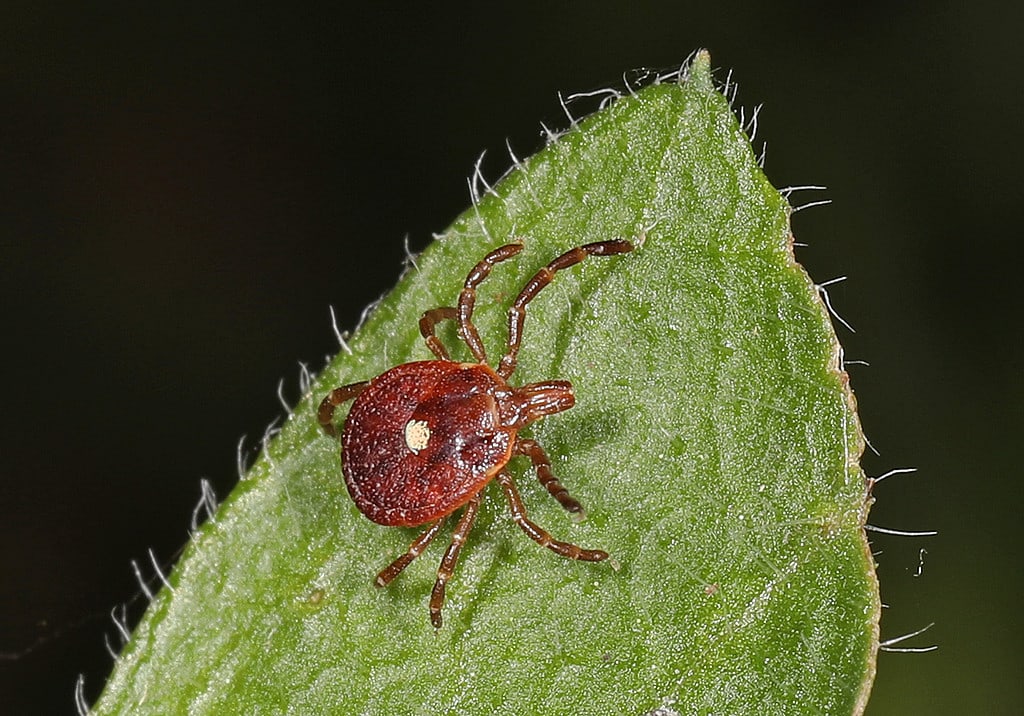
Ticks can be found all around your house in many places.
©Judy Gallagher / CC BY 2.0 – License
Now that we know that oppossums will snack on ticks when they get the chance, it is good to look into ways of discouraging the little insects from coming near your house, family, and pets. A common question asks about whether or not mowing your grass and keeping it somewhat low will be a good habit that can also keep ticks away.
Generally speaking, the answer to that question is yes, keeping your lawn mowed will help keep ticks out of your yard. The main reason is because ticks prefer taller grass and also bushes, trees, and shrubs that give them a platform to snatch a ride onto a potential host. If the grass is low, the insects probably do not feel as hidden and secure. There could be a possum around the corner!
The photo featured at the top of this post is © iStock.com/galinast
Sources
- Science Direct, Available here: https://www.sciencedirect.com/science/article/abs/pii/S1877959X21001333?via%3Dihub
- National Library of Medicine, Available here: https://www.ncbi.nlm.nih.gov/pmc/articles/PMC2825780/?fbclid=IwAR2ZETy9XM742XLIgsRL0xbRHdEQ6awUcfFmS1ntZCzV3MqjgBWy-rqg5H8
Thank you for reading! Have some feedback for us? Contact the AZ Animals editorial team.



